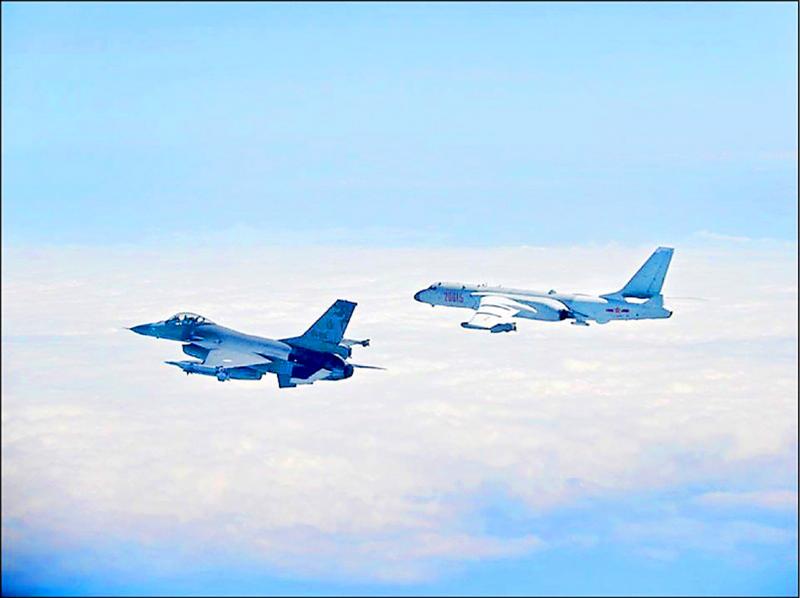The military must adjust its strategies as the methods of the Chinese People’s Liberation Army (PLA) Air Force undergo a qualitative shift, retired Republic of China Air Force deputy commander Chang Yen-ting (張延廷) said on Saturday.
Over the past few months, there have been frequent sightings of Chinese military aircraft near Taiwan and Ministry of National Defense data shows that an incursion on Aug. 10 was the third time since March last year that PLA aircraft had crossed the median line of the Taiwan Strait.
Military tensions between China and the US in the Strait and the South and East China seas are continuing to escalate, while tensions between Taiwan and China have become a norm, Chang said, adding that both situations increase the likelihood of triggering a flashpoint in the region.

Photo courtesy of Ministry of National Defense
The Taiwanese military considers the air space encompassing the 12 nautical miles (22.2km) from the coast of Taiwan to the median line as the “inception zone,” where it monitors aircraft, broadcasts messages to chase any that enter out and can order surface-to-air missile units to be placed on standby if needed, Chang said.
However, the emergency scrambling of Taiwanese fighters is starting to have an effect on equipment maintenance and pilot fatigue, and the military must make adjustments to its standing systems, he added.
“We cannot be led about by the nose by the enemy,” Chang said.
One of the China’s common methods to test Taiwanese reaction speed and capability is to perform military exercises west of the median line before sending aircraft across it, he said.
“We must take notice and come up with a way to react and counter their probing efforts,” he said.
Should the international community become used to China’s attempt to show its sovereignty over the region, it could become easy for them to misperceive the Strait and nearby area as Chinese territory, he said.
The military must prevent China from using its strategies of unrestricted warfare, or precision or decapitation strikes, in or near the Strait, Chang said.
The air force has many weaknesses it must address, he said, citing its mainstay fighters, which are parked in open hangars.
“The forces committed to the defense of airfields is spread too thin over a wide area,” he said, adding that compared to Israel, Taiwan’s airfields are lightly guarded.
If China were to target the eight main strategic airfields with fast-strike units, such as people on motorcycles with grenades at times when defense is lax, it would be easy to wipe out Taiwan’s main combat jets, Chang said.
Without air superiority, Taiwan would be forced to cede the skies to China, which would spell a different outcome should hostilities across the Strait resume, he said.
Chang’s comments follow media reports that cited a former military instructor, who was not named, as saying that should Taiwan lose air superiority, the nation’s defenses would not last 48 hours.
The Air Force Command Headquarters on Saturday said that anti-air units are deployed near strategic targets and it has stepped up anti-air defense capabilities.
It said that Taiwanese can rest assured, as the air force has contingency plans to allow it to “swiftly recuperate and regain combat capabilities” should airfields be damaged.

Taiwan is stepping up plans to create self-sufficient supply chains for combat drones and increase foreign orders from the US to counter China’s numerical superiority, a defense official said on Saturday. Commenting on condition of anonymity, the official said the nation’s armed forces are in agreement with US Admiral Samuel Paparo’s assessment that Taiwan’s military must be prepared to turn the nation’s waters into a “hellscape” for the Chinese People’s Liberation Army (PLA). Paparo, the commander of the US Indo-Pacific Command, reiterated the concept during a Congressional hearing in Washington on Wednesday. He first coined the term in a security conference last

Prosecutors today declined to say who was questioned regarding alleged forgery on petitions to recall Democratic Progressive Party (DPP) legislators, after Chinese-language media earlier reported that members of the Chinese Nationalist Party (KMT) Youth League were brought in for questioning. The Ministry of Justice Investigation Bureau confirmed that two people had been questioned, but did not disclose any further information about the ongoing investigation. KMT Youth League members Lee Hsiao-liang (李孝亮) and Liu Szu-yin (劉思吟) — who are leading the effort to recall DPP caucus chief executive Rosalia Wu (吳思瑤) and Legislator Wu Pei-yi (吳沛憶) — both posted on Facebook saying: “I

The Ministry of Economic Affairs has fined Taobao NT$1.2 million (US$36,912) for advertisements that exceed its approved business scope, requiring the Chinese e-commerce platform to make corrections in the first half of this year or its license may be revoked. Lawmakers have called for stricter enforcement of Chinese e-commerce platforms and measures to prevent China from laundering its goods through Taiwan in response to US President Donald Trump’s heavy tariffs on China. The Legislative Yuan’s Finance Committee met today to discuss policies to prevent China from dumping goods in Taiwan, inviting government agencies to report. Democratic Progressive Party Legislator Kuo Kuo-wen (郭國文) said

The Ministry of Economic Affairs has fined Taobao NT$1.2 million (US$36,900) for advertisements that exceeded its approved business scope and ordered the Chinese e-commerce platform to make corrections in the first half of this year or its license would be revoked. Lawmakers have called for stricter supervision of Chinese e-commerce platforms and more stringent measures to prevent China from laundering its goods through Taiwan as US President Donald Trump’s administration cracks down on origin laundering. The legislature’s Finance Committee yesterday met to discuss policies to prevent China from dumping goods in Taiwan, inviting government agencies to report on the matter. Democratic Progressive Party